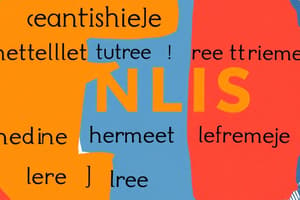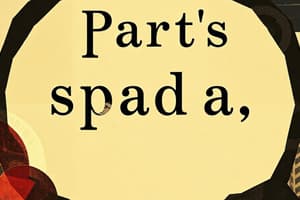Podcast
Questions and Answers
Which of the following sentences contains a verb that expresses an action?
Which of the following sentences contains a verb that expresses an action?
- He is a doctor.
- The sky is blue.
- The cat is fluffy.
- She sings a song. (correct)
A verb is a word that describes a noun.
A verb is a word that describes a noun.
False (B)
The children ______ in the playground.
The children ______ in the playground.
run
Match each sentence with the verb it contains:
Match each sentence with the verb it contains:
Which sentence does NOT contain a verb?
Which sentence does NOT contain a verb?
Verbs are only used to describe physical actions.
Verbs are only used to describe physical actions.
Provide an example of a verb that describes a state of being.
Provide an example of a verb that describes a state of being.
The dog ______ loudly at the stranger.
The dog ______ loudly at the stranger.
Match each picture to the sentence that describes the action:
Match each picture to the sentence that describes the action:
Which of the following would be considered a proper noun?
Which of the following would be considered a proper noun?
Common nouns always start with a capital letter.
Common nouns always start with a capital letter.
Provide any example of a common noun.
Provide any example of a common noun.
We live in ______.
We live in ______.
Match the nouns with their correct classification:
Match the nouns with their correct classification:
Which of the following sentences uses the correct form of the verb 'to be' in the past tense?
Which of the following sentences uses the correct form of the verb 'to be' in the past tense?
Gerunds function as nouns and are formed by adding '-ing' to a verb.
Gerunds function as nouns and are formed by adding '-ing' to a verb.
Explain the difference between a transitive and an intransitive verb, providing an example of each.
Explain the difference between a transitive and an intransitive verb, providing an example of each.
Unlike common nouns like book or dog, a ______ noun such as Harry Potter or Buddy refers to specific entities and requires capitalization.
Unlike common nouns like book or dog, a ______ noun such as Harry Potter or Buddy refers to specific entities and requires capitalization.
Which of the following sentences best exemplifies the use of a subjunctive verb?
Which of the following sentences best exemplifies the use of a subjunctive verb?
Explain the significance of auxiliary verbs in constructing complex verb phrases. Include two examples illustrating how a change in auxiliary verbs alters the meaning.
Explain the significance of auxiliary verbs in constructing complex verb phrases. Include two examples illustrating how a change in auxiliary verbs alters the meaning.
Flashcards
What is a verb?
What is a verb?
An action word that shows what someone or something is doing. It expresses an action, event, or state of being.
Why are verbs important?
Why are verbs important?
Verbs make sentences clear by showing action, which enables communication and storytelling.
What is a Noun?
What is a Noun?
Names of persons, places, things, animals, or events. Can be common or proper.
What is a Common Noun?
What is a Common Noun?
Signup and view all the flashcards
What is a Proper Noun?
What is a Proper Noun?
Signup and view all the flashcards
Study Notes
- English can be split into four quarters
Verbs
- Verbs identify action words.
- Verbs are action words describing what someone is doing.
- They are essential in sentences, indicating actions, events, or feelings.
- Verbs facilitate communication about daily occurrences.
Verb Examples:
- Run - I can run fast.
- Jump - She jumps high.
- Eat - We eat delicious food.
- Sing - He sings a song.
- Write - They write a story.
Key point about verbs
- Action words, or verbs, clarify actions in sentences.
- They simplify communication and storytelling, particularly when demonstrated or used often.
Nouns
- Nouns recognize names of people, objects, things, and places.
- Nouns are names of persons, places, things, animals, or events.
- Nouns can be categorized as common or proper.
Common Nouns:
- Common nouns are general names for persons, places, things, animals, or events.
- They begin with a lowercase letter unless starting a sentence.
- Examples: trees, cars, shoes, fruits, and mountains.
Proper Nouns:
- Proper nouns are specific names of persons, places, things, animals, or events.
- They always begin with a capital letter.
- Examples: Jean, Johannes, Lolo Ando, Mango Tree, Mr. Manaloto, Mrs. Manaloto, and Quituinan Hill.
Examples of Person
- Common noun is teacher.
- Proper noun is Mr. Santos.
Examples of Things
- Common noun is book.
- Proper noun: Harry Potter.
Examples of Place
- Common noun: park.
- Proper noun: Luneta Park.
Examples of Animals
- Common noun: dog.
- Proper noun: Buddy.
Examples of Events
- Common noun: holiday.
- Proper noun: Christmas.
Key point about nouns
- Nouns name people, places, things, animals, and ideas.
- Nouns clarify communication and understanding.
Studying That Suits You
Use AI to generate personalized quizzes and flashcards to suit your learning preferences.




